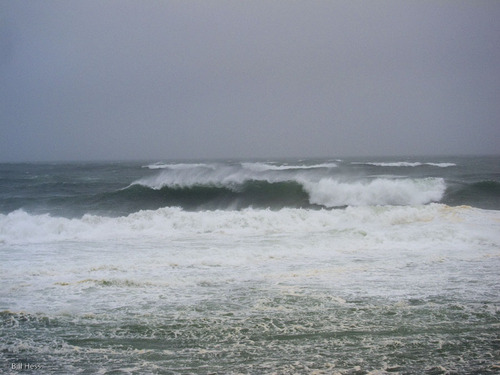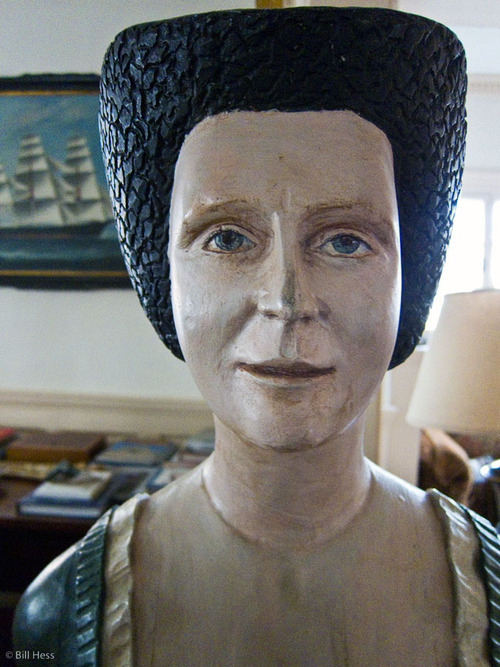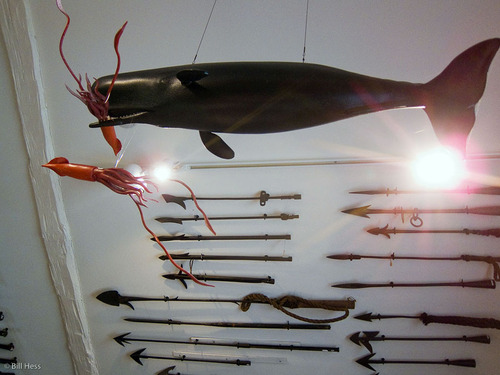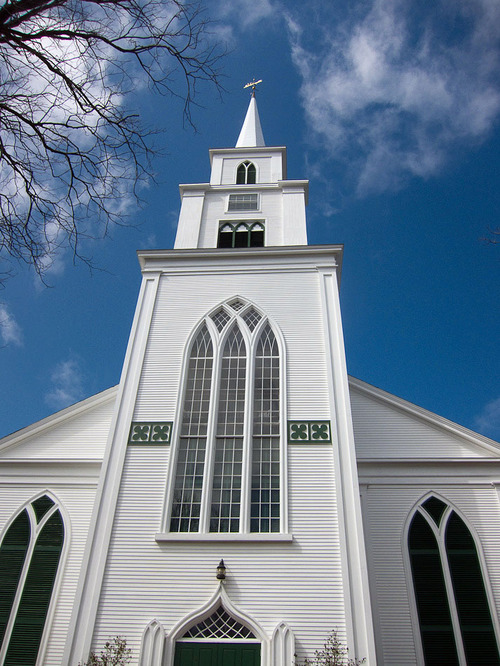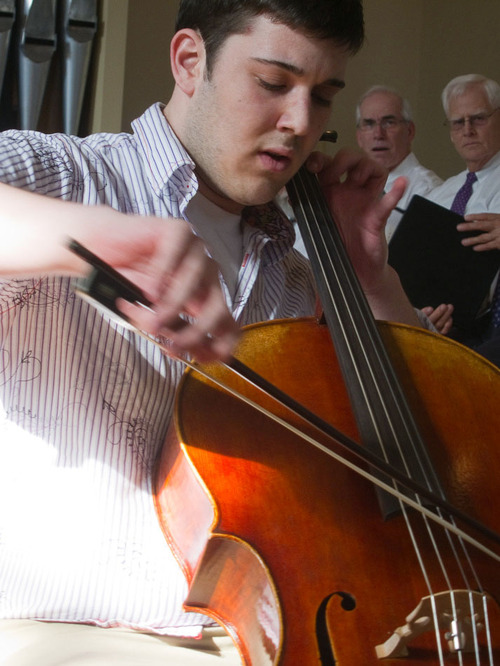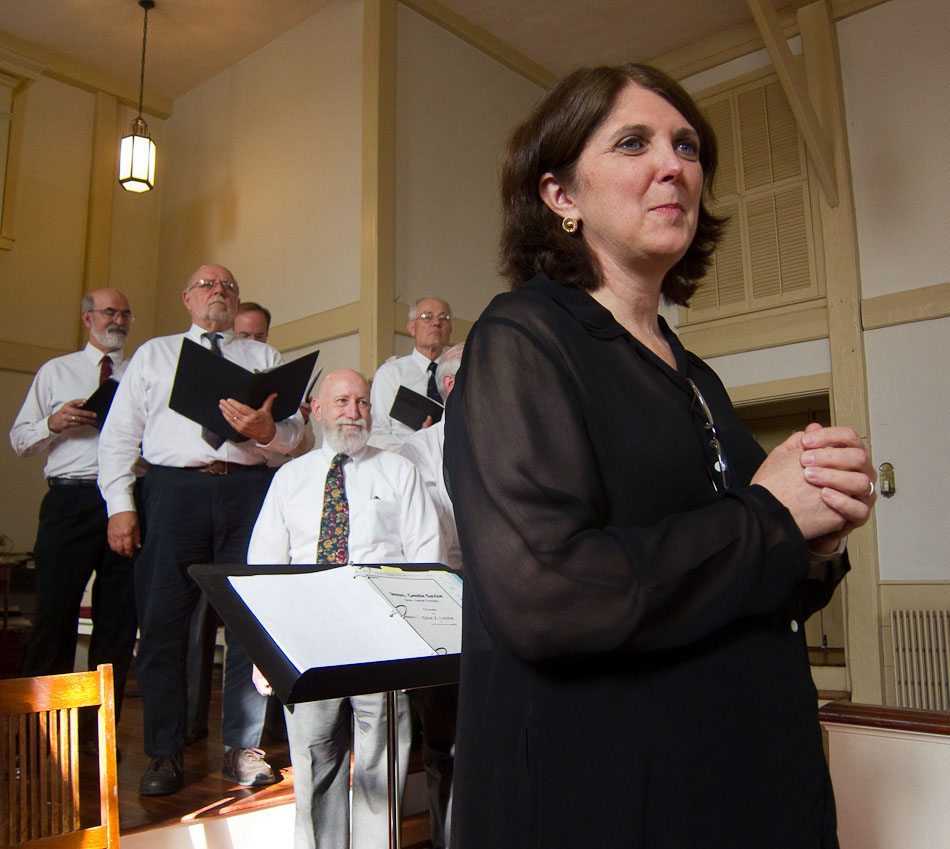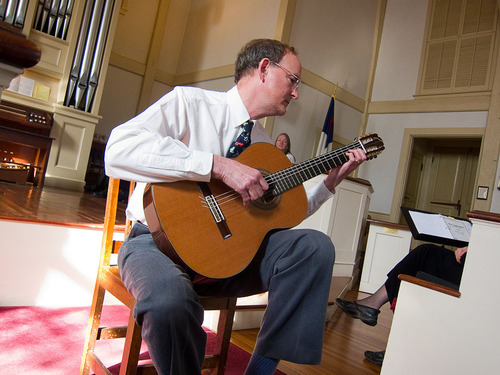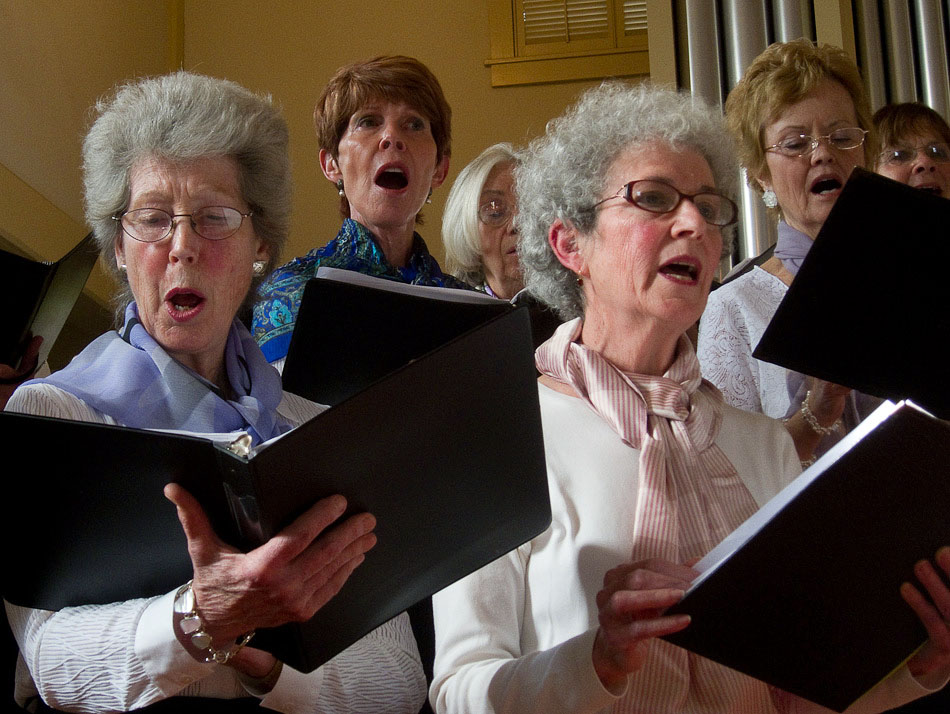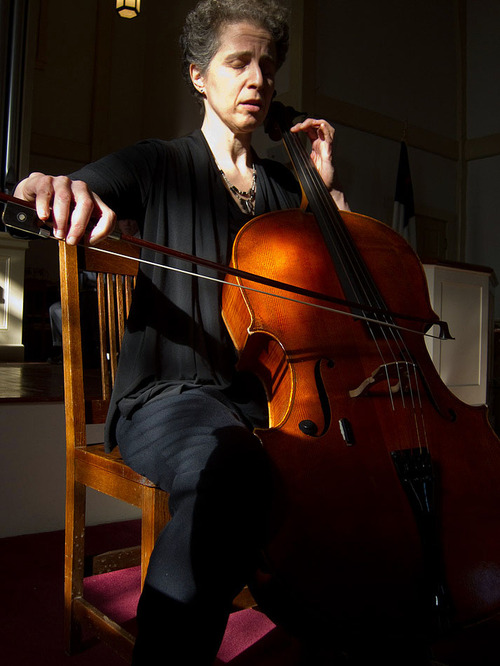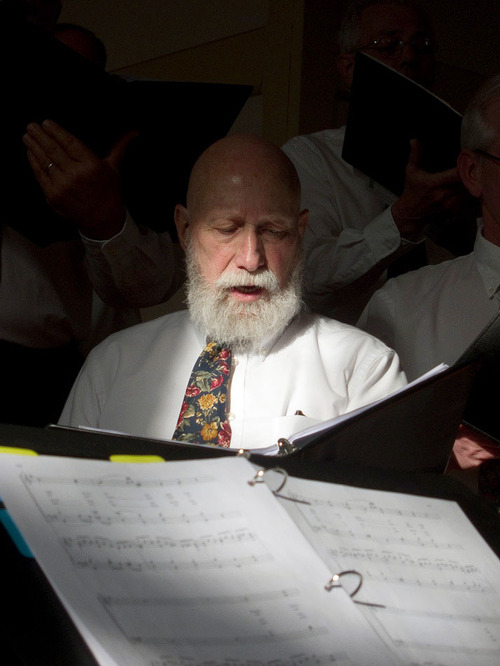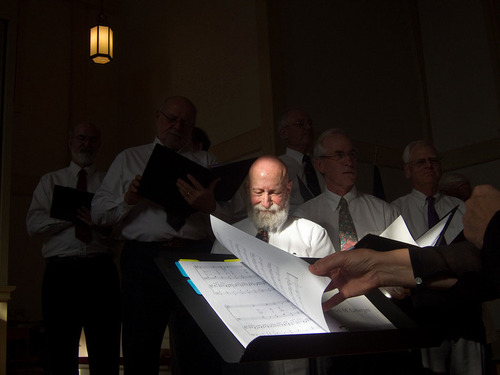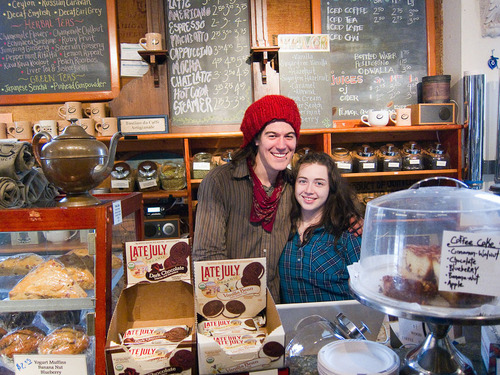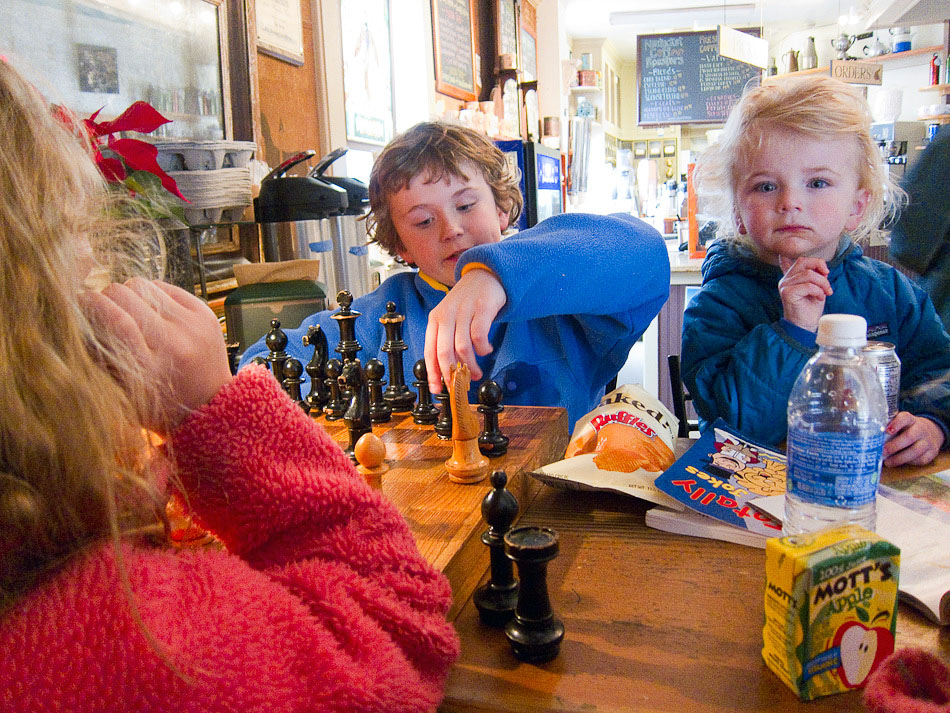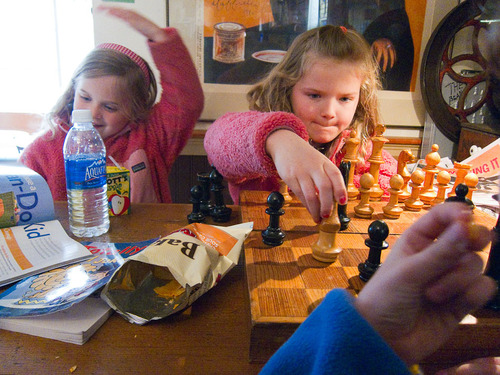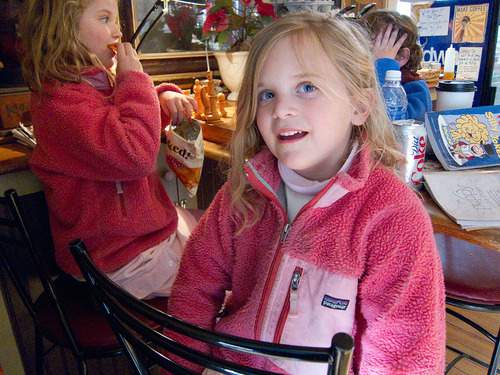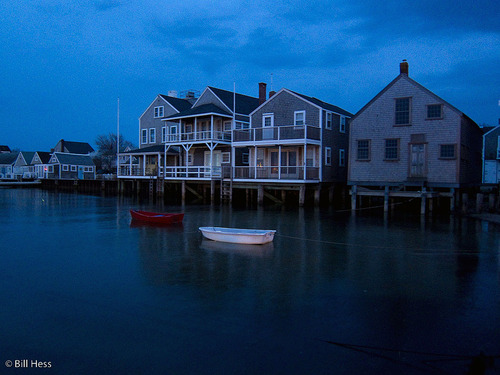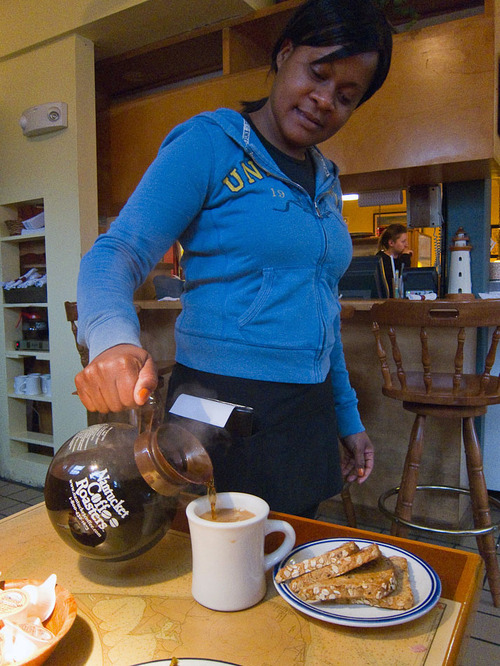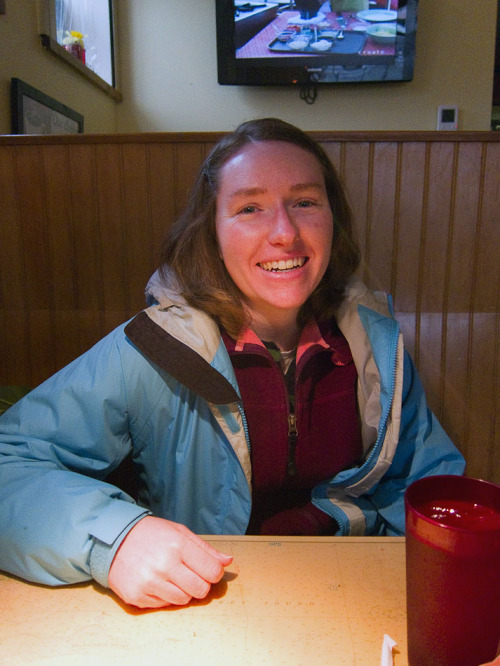
After consuming an excellent ham, cheddar and mushroom omelette at the Fog Island cafe, I walked over to the whaling museum to meet with Eric, so that we could do a technology check in advance of my slide show, which was scheduled for 2:00 PM.
As I approached the museum, I saw this dog, gazing longingly at the door.

To get to Eric, I had to go around to a side door, which was locked. A gentleman named Peter showed up and was going to unlock the door for me, but before he could, Eric opened the door from the inside and let us.
This is Peter. He said he would be taking my picture during my presentation.
For some reason, I took no pictures of the bright, young, Eric as he worked to solve the inevitable technology problems that we experienced as we crossed over from Mac to PC, but I had photographed him the day before. When I get a chance to catch up somewhat with what I have seen and done so far in Nantucket, I will introduce Eric to my readers.

After the technology check, I headed back to the 18th century mansion called 99 Main, owned by the Nantucket Historical Society. It serves as a guest house and is quite comfy. I took a shower, put on slacks, a decent shirt and my ivory, balleen, and ugruk-tooth bolo tie, made by Simeon Patoktak, and then walked back to the museum.
As I approached, I saw my dad ahead of me, sitting in a wheelchair. No, no, it wasn't my dad, because we buried him almost two years ago. It was another veteran of World War II and when I saw him, I loved him immediately. I knew nothing more about him than what I could see - I did not know his politics, where he was born, raised, if he had been married once, twice, not all, how many children, grandchildren, great-grandchilden and such he had, if he was of pleasant or ill disposition, how he had made his living, but it didn't matter.
I loved him because he had fought alongside my dad, even though Dad fought over North Africa and Europe from inside a B-24 bomber and this gentleman fought from Navy ships in the South Pacific.
Still, they had fought alongside each other and ultimately they did it for me, even though I had not yet been born, and so I loved him.
I asked his name, but in the flurry of activity that was about to follow, I forgot it.
So he is just "Dad" - every dad who fought in World War II, on land, sea or in the air.
None of them had it easy, and those who did not die all risked their lives. They rapidly leave us.
So love all those who remain, while they are here.

This is actually from the day before, when I went into the gallery where they have hung my pictures and met with the museum's interpretive staff, the one's who will be on hand to answer questions from those who wonder through the gallery between now and June 15, when my show will come down.

Before my presentation began, I saw these ladies looking at my photographs.

I have to say the presentation went very well. I showed slides and spoke off the top of my head for over an hour, answered questions for a good half hour and then just visited people for a good spell after that.
I had been worried that my presentation was too long, but many people told me that they did not want me to stop, but to keep going, to keep showing slides and telling stories.
So that was kind of nice.
This is the left-hand side of the audience, at the beginning of the question and answer session. Of course, from their perspective, it is the right hand side.

And this is the middle.

And here we have the right side.

In my slide presenation, I had one image taken from a boat that showed some people standing on the edge of the ice, shouting out their joyous welcomes as the boats that I had been traveling with returned with a whale. That image was followed by another that I took from the ice, behind people who where waving at the people in boats returning with a whale and those people were waving back.
He wondered how I had been able to do that - to take a photo from inside the boat and on the ice at the same time.
But I had actually taken the two images at different times, the first in Wainwright from the boat of Ben Ahmaogak, Sr., and the second in Barrow, as Simeon Patkotak, the man who made my bolo tie, returned to the ice with a bowhead.

The fellow addressing me here is Jeff Allen, a Nantucket-based photographer. In fact, it is he who printed the 60 or so images that were hung on his new, large format Epson printer, from digital files that I had sent down.
I had been a bit worried about this, but he did an excellent job.
Thank you, Jeff.

Although I hoped it might prove otherwise, these days, I have found that I can not go anywhere Outside as a person from Wasilla, Alaska, and not be asked something about Sarah Palin.
This is what I was asked: how did the Native people feel about her and, in conjunction with that question, I was asked whether the whalers saw global warning as fact or myth.
As to the first part, I answered that Alaska Natives are a diverse group of people with different thoughts and opinions and so one could undoubtedly find some who like Sarah Palin. But, notwithstanding her marital tie to a man who is one-quarter Yup'ik, as Governor, Palin took the position that Natives should have no hunting and fishing rights beyond those of all Alaskans. She has not changed this position.
She does not recognize the fundamental, basic, aboriginal right to survive upon their own ancestral lands in their own way, a right precedes by many thousands of years the forming of the State of Alaska, the foundation of the United States and the birth of Columbus - a right that is essential to the nutritional, spiritual and pyschological need to survive as the people they are.
When a politician takes such against the very foundation of a people's way of life and identity, it tends not to endear her among them.
As to the second question, when a people sees that the solid ice that has also sustained and built their culture melt earlier each year, retreat further, come back later, making their lives more difficult, and when they see new plants advancing from the south into their homeland, when fish that are indigenous to waters warmer than Arctic seas have traditionally been, then they pretty much know that the world is warming.

Although Gift of the Whale is now out of print, the museum has a decent stock in their bookstore and a number of people bought copies and had me sign them.
I signed this one for Marjan, the beautiful lady sitting beside me. Marjan was born in Tehran, Iran and moved to New York City as a child. When she grew up, she went off to Antartica to work and live for awhile. She has yet to make her first trip to Alaska, but she wants to and I am certain that she will.
That's Tony in front.
Ben Simons took the picture with my camera. Regular readers know that it is my policy that if I put a picture in here taken by someone else, I must first put in on a computer or iPhone screen and then take a picture of that before I post it.
But I am way behind and want to get this post up and in ten or fifteen minutes I must leave here to go meet some folks, so I am violating my own rule and post this straight as Ben shot it.

I also signed a book for these kids and their mom. I had met them the day before at the Bean, a very excellent coffee shop that reminds me a little bit of Vagabond Blues in Palmer. I took some pictures of them in the coffee shop and will post them when I get a chance.
They greeted me as though I were a familiar uncle and not a strange man from Alaska who they had briefly met just the day before.
Everyone that I have met in Nantucket, whether by introduction or chance, whether they are aware of what brought me here or have no idea, has been very friendly.
I have to say, Nantucket, Massachusetts, is a friendly town.
I'm certain there must be a few mean people here, because there always is, but I have yet to meet one.

Here's Tony again. He and Ben took me to a nearby bar afterward. Tony is telling me about a baleen scrimshaw collection that he looks after for the museum. It is Yankee Whaler scrimshaw and he says it is excellent. Before I leave, Tony is going to take me on a tour of the whole Island and he is going to show me the collection.

Our beautiful waitress takes our order, including a heaping plate of nachos covered with beans, peppers, onions and lots and lots of jalepenos - just the kind of thing that I love, the kind of thing that has given me a horrendous reflux condition and I now face the choice to fight it off or indulge, suffer and even die early.
I did partake, but I did not indulge, as badly as I wanted to.

And here is Ben, who has coordinated the show and this entire experience for me. He wants me to come back and I want to come back. The best time for the museum is in the summer, when there are many people visiting Nantucket.
The worst time for me is in the summer, when I simply do not want to venture very far south of 60 degrees, north latitude.
 Wednesday, March 31, 2010 at 5:01AM
Wednesday, March 31, 2010 at 5:01AM 
